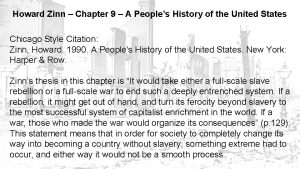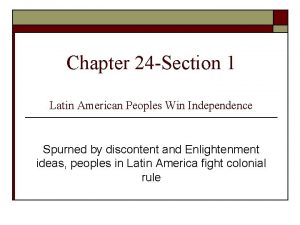Howard Zinn Chapter 9 A Peoples History of

















- Slides: 17

Howard Zinn – Chapter 9 – A People’s History of the United States Chicago Style Citation: Zinn, Howard. 1990. A People's History of the United States. New York: Harper & Row. Zinn’s thesis in this chapter is “It would take either a full-scale slave rebellion or a full-scale war to end such a deeply entrenched system. If a rebellion, it might get out of hand, and turn its ferocity beyond slavery to the most successful system of capitalist enrichment in the world. If a war, those who made the war would organize its consequences” (p. 129). This statement means that in order for society to completely change its way into becoming a country without slavery, something extreme had to occur, and either way it would not be a smooth process. .

Political Economic Social Other Fugitive Slave Act (of 1850) allowed plantation owners to reclaim slaves accused of escaping Rise in tobacco and cotton production caused a major influx in slave population Danced and sang not because they were Certain plantation owners would change happy, but to preserve their heritage and methods of punishment and would, at keep moral times, randomly punish slaves because they believe it established authority Courts and laws were manipulated in order to further oppress slaves Popular Sovereignty- self ruling state (specifically pertaining to slavery) As the situation progressed, slaves Religion (specifically Christianity) was realized they could not rely on anyone used effectively to further oppress blacks else other then themselves to initiate, or follow through on a rebellion Lincoln combined perfectly the needs of Fugitive Slave Act- the government said Slavery posed a national guilt, rather than Slave importation was banned in 1808, business, the political ambition of the that they would give a reward for anyone just a guilt felt in the south yet people continued to import slaves new Republican party, and the rhetoric who turned in a “fugitive slave” illegally of humanitarianism. (Also Social) The Constitution had clauses which were Louisiana Purchase-introduces a ton of able to be stretched and worked due to new states which need to be declared the vagueness of the wording (The slave states or non-slave states Elastic Clause) Popular Sovereignty- self ruling state (specifically pertaining to slavery) Slave owners had believed that if they had given slaves Christianity, that they would be more obedient Lincoln ends slavery-prior to that he revoked the Fugitive Slave Act. abolishonist vs. pro-slavery $12 -15/slave/year $250 k on punishment $5. 898 million spent to punish rebelling slaves Fugitive Slave Act- This effected blacks Virginia Standing Army-Virginia created a radically because even blacks who had military of over one hundred thousand never been slaves were being turned in soldiers in order to avoid any turmoil as fugitives John Brown and Nat Turner- both very religious people who considered their acts messiah-esque The Second Awakening- Christianity had a renaissance in which the church became more chill in order to reach out to a wider majority Racial segregation-it was tabooed for whites and blacks to have any form of collaboration. Changing perception of blacks

Do Now Imagine that you have two sons. Your older son has been bullying and fighting your younger son. The older son says he is upset because the younger son gets more attention. You punish your son, and he responds by running away from home. Before he leaves, he steals $500 from you. What would you do when your son returns? Would you punish him harshly so he won’t do it again, or be lenient with him if he promises not to do it again? Explain your choice

Wartime Reconstruction Plans A. Reconstruction refers from the time from 1865 to 1877 when the Reconstruction South was brought back into the Union B. During the Civil War, the U. S. government was divided in its divided Reconstruction plans 1. Lincoln favored quick re-admission & pardons to control the quick South; His Ten Percent Plan was rejected 2. Congressional Republicans believed in “state suicide” theory; suicide Their Wade-Davis Bill was strict but was vetoed C. The government had no plans in place when the Civil War ended plans

Lincoln vs. Congress Lincoln’s Plan (10% Plan) Radical Republican Response Abraham Lincoln had thought about the process of restoring the Union from the earliest days of the war. His guiding principles were to accomplish the task as rapidly as possible and ignore calls for punishing the South. In late 1863, Lincoln announced a formal plan for reconstruction: 1. A general amnesty would be granted to all who would take an oath of loyalty to the United States and pledge to obey all federal laws pertaining to slavery 2. High Confederate officials and military leaders were to be temporarily excluded from the process 3. When one tenth of the number of voters who had participated in the 1860 election had taken the oath within a particular state, then that state could launch a new government and elect representatives to Congress. 4. The states of Louisiana, Arkansas and Tennessee rapidly acted to comply with these terms. Despite an early position showing a vindictive streak, Andrew Johnson continued Lincoln's plan for reconstruction when he took office after Lincoln's assassination. Civil governments were set up, except in the state of Texas, after conventions in each state officially abolished slavery, repudiated their debts, and canceled the acts of secession. Representatives were elected to serve in Congress. The Radical Republicans voiced immediate opposition to Lincoln’s reconstruction plan, objecting to its leniency and lack of protections for freed slaves. Congress refused to accept the rehabilitation of Tennessee, Arkansas, and Louisiana. In July 1864, Congress passed the Wade-Davis Bill, their own formula for restoring the Union: 1. A state must have a majority within its borders take the oath of loyalty 2. A state must formally abolish slavery 3. No Confederate officials could participate in the new governments. Lincoln did not approve of this plan and exercised his pocket veto. An angry Congress would later pass the Wade-Davis Manifesto (August 1864), which charged Lincoln with usurping the powers of Congress. This statement would have little impact on the public, as the military news from the South improved; Sherman’s Atlanta Campaign restored Lincoln’s popularity and helped assure his reelection.

Assassination of Lincoln

Johnson vs. Congress Johnson’s Plan Radical Republican Plan The looming showdown between Lincoln and the Congress over competing reconstruction plans never occurred. The president was assassinated on April 14, 1865. His successor, Andrew Johnson of Tennessee, lacked his predecessor’s skills in handling people; those skills would be badly missed. Johnson’s plan envisioned the following: Pardons would be granted to those taking a loyalty oath No pardons would be available to high Confederate officials and persons owning property valued in excess of $20, 000 A state needed to abolish slavery before being readmitted A state was required to repeal its secession ordinance before being readmitted. Most of the seceded states began compliance with the president’s program. Congress was not in session, so there was no immediate objection from that quarter. However, Congress reconvened in December and refused to seat the Southern representatives. Reconstruction had produced another deadlock between the president and Congress. Charles Sumner quote regarding Andrew Johnson’s Reconstruction Plan “This is one of the last great battles with slavery. Driven from the legislative chambers, driven from the field of war, this monstrous power has found a refuge in the executive mansion, where, in utter disregard of the Constitution and laws, it seeks to exercise its ancient, far-reaching sway. All this is very plain. Nobody can question it. Andrew Johnson is the impersonation of the tyrannical slave power. In him it lives again. ” The postwar Radical Republicans were motivated by three main factors: 1. Revenge — a desire among some to punish the South for causing the war 2. Concern for the freedmen — some believed that the federal government had a role to play in the transition of freedmen from slavery to freedom 3. Political concerns — the Radicals wanted to keep the Republican Party in power in both the North and the South. On the political front, the Republicans wanted to maintain their wartime agenda, which included support for: Protective tariffs Pro-business national banking system Liberal land policies for settlers Federal aid for railroad development If the South were to fall back into Democratic hands, these programs would suffer. This threat brought many Republicans around to supporting the vote for blacks (15 th Amendment). Grateful freedmen voting Republican would help to maintain the status quo. The postwar Congress pushed through a number of measures designed to assist the freedmen, but also demonstrate the supremacy of Congress over the president. These measures included the Civil Rights Act of 1866, the 14 th Amendment, the Tenure of Office Act and the Army Appropriations Act. The culmination of this process occurred in 1867 and 1868, when Congress passed a series of Reconstruction Acts; these measures were implemented

Johnson vs. Congress A. The Andrew Johnson Irony: America’s 1 st Reconstruction president was a southern, white supremacist 1. Johnson’s Reconstruction Plan called for provisional governors & state ratification of the 13 th Amendment 2. Southerners reluctantly obeyed but passed Black Codes to Codes continue to oppress former slaves Examples of Black Codes

Johnson vs. Congress C. The 14 th Amendment: 1. In 1866, Congress passed 2 bills: extension of Freedmen’s Bureau & a Civil Rights Act 2. President Johnson vetoed both, but Congress overrode both vetoed overrode vetoes (1 st time ever!) 3. Congress passed 14 th Amendment to protect the civil rights of former slaves in the South D. Congress passed a Radical Reconstruction Plan in 1867 1. Included redistribution of planter lands, black suffrage, division of the South into five military zones 2. But the military was not adequate & Johnson repeatedly obstructed Reconstruction plans


Johnson vs. Congress E. Johnson’s Impeachment Crisis 1. House overwhelmingly voted for Johnson’s impeachment but the impeachment Senate failed to convict & remove him 2. Johnson was saved by his “high crimes” argument & Congressional fear of establishing such a precedent


Reconstructing Southern Society A. Three conflicting interests existed in the South: Southern whites, freed blacks, & Northern whites B. A New Slavery: Sharecropping & the Crop-Lien System Slavery 1. The Civil War destroyed Southern transportation, plantations, & ended the Southern slave-labor system 2. Sharecropping allowed blacks to be free farmers but it led to debt and liens on their future crops liens 3. Black codes and violence were used to keep blacks from voting or violence competing against whites economically


Reconstructing Southern Society C. Republican Rule in the South 1. The Southern Republican Party was formed in 1867 of carpetbaggers, carpetbaggers scalawags, poor whites, & blacks 2. Many blacks were elected to Southern state governments and as Congressmen in the national Congressmen government

Reconstructing Southern Society D. Gaining Rights for Blacks 1. The 15 th Amendment was Amendment passed in 1870 to protect voting rights for all Americans regardless of race or color 2. Blacks used the law to protect marriages and gain an marriages education

Apply your knowledge Why is reconstructing the nation following the Civil War such a difficult task? Explain!
 Zinn chapter 9 answers
Zinn chapter 9 answers Zinn chapter 21 summary
Zinn chapter 21 summary Orbitanın duvarları
Orbitanın duvarları Kanalis optikus
Kanalis optikus Functions of ciliary body
Functions of ciliary body Perry zinn rowthorn
Perry zinn rowthorn 3 reasons why the u.s. entered ww1
3 reasons why the u.s. entered ww1 Spiral of tillaux
Spiral of tillaux Latin american people win independence
Latin american people win independence Pastoral peoples on the global stage
Pastoral peoples on the global stage Chapter 11 pastoral peoples on the global stage
Chapter 11 pastoral peoples on the global stage Arab social structure
Arab social structure Maturity continuum model by stephen
Maturity continuum model by stephen John calvin peoples
John calvin peoples Clap your hands all ye peoples make a joyful noise
Clap your hands all ye peoples make a joyful noise Latin american peoples win independence
Latin american peoples win independence Native american cultural areas
Native american cultural areas World council of indigenous peoples
World council of indigenous peoples

































